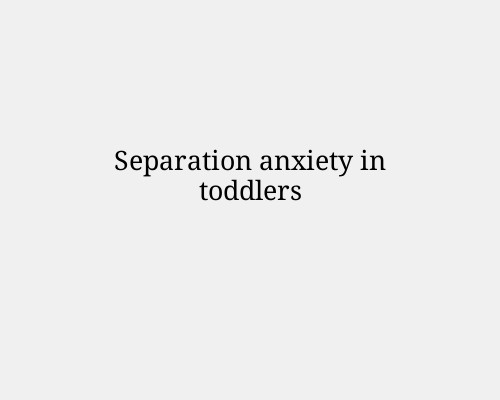
Separation anxiety in toddlers is a normal stage of emotional and social development, though it can feel intense for both the child and the parent. It’s most common between 8 months and 3 years old, but it can vary in intensity and timing for each child.
Why it happens
Developmental awareness – Around 8–12 months, toddlers begin to understand object permanence (that things exist even when out of sight). They now realize you’re “gone” when you leave, but they haven’t learned you always come back.
Attachment bonds – Toddlers are strongly attached to their primary caregivers, so separation can feel like a loss.
New situations – Changes in caregivers, routines, or environments (e.g., day care, moving house) can make it worse.
Typical signs
Crying, clinging, or tantrums when you leave.
Refusal to be comforted by others.
Following you from room to room.
Sleep disturbances if you’re not nearby.
Ways to help
Before separation
Practice short separations
Leave the room for a short time and return, gradually increasing the duration.
Create a goodbye ritual
A consistent, quick routine (hug, kiss, wave) helps signal that you’ll return.
Talk about what will happen
Even toddlers benefit from simple explanations: “Mommy is going to the shop. I’ll be back after snack time.”
Leave something familiar
A blanket, toy, or even a piece of your clothing can be comforting.
During separation
Keep goodbyes short and positive – Lingering can increase anxiety.
Stay calm and confident – Toddlers read your emotions; if you look worried, they might feel unsafe.
Trust the caregiver – A consistent, caring person makes the transition easier.
After separation
Reunite warmly – Show excitement to see them, reinforcing that you always come back.
Validate their feelings – “I know you missed me. I missed you too.”
When to seek extra support
If separation anxiety:
Lasts well beyond 3–4 years old.
Is so severe that it prevents them from engaging in normal activities.
Comes with extreme clinginess, panic attacks, or withdrawal.
This could signal separation anxiety disorder, which may benefit from paediatric or child psychology input.